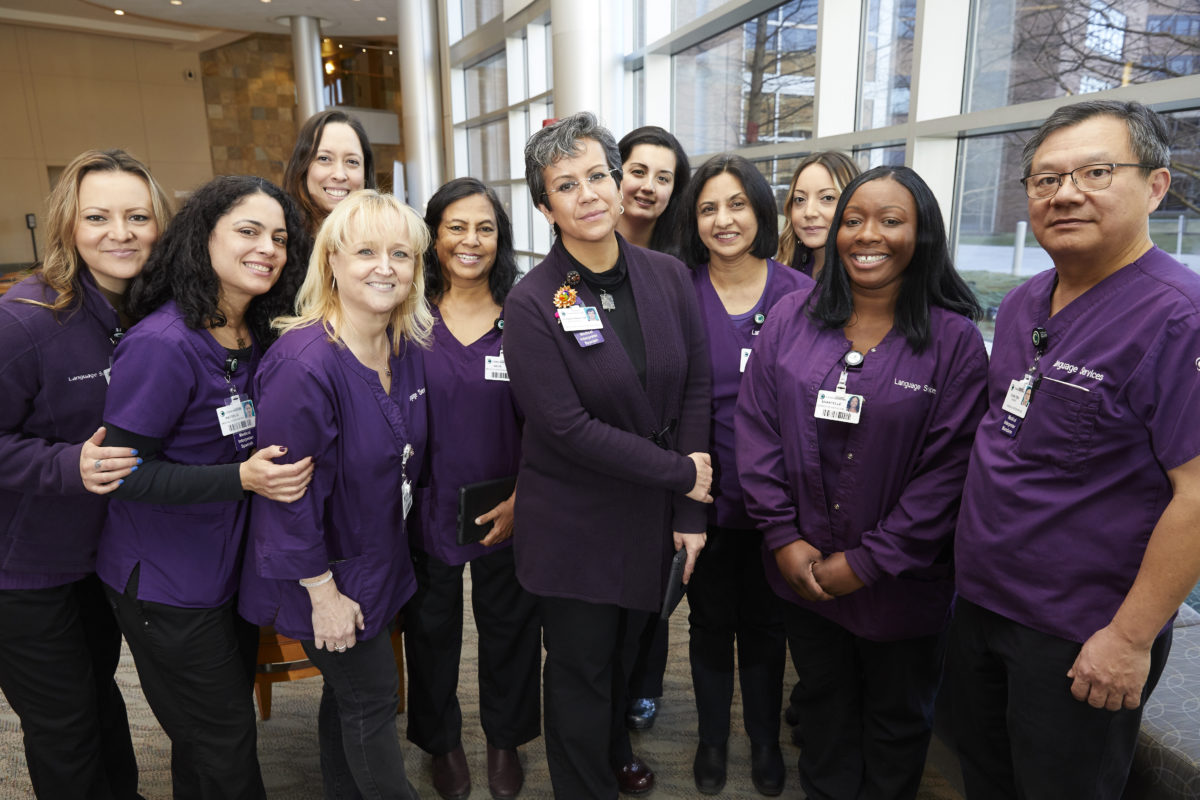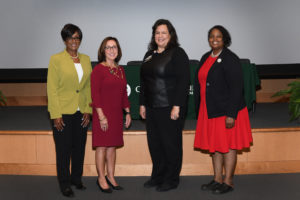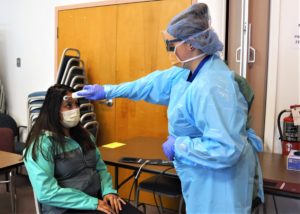It’s a Monday morning, and Asha Champaneria sits in front of a camera mounted near her computer at the new Language Services office at Christiana Hospital.
How to request an interpreter
At Christiana Care, all limited English proficiency and deaf patients are entitled to a qualified medical interpreter (in-person, telephonic or video), free of charge. Please ask for an interpreter when you make your next appointment. You may also call Christiana Care Language Services at 302-733-1861 or e-mail interpreters@christianacare.org. When possible, please call at least 48 hours before your appointment.
Please do not rely on friends or family members to interpret during a health care visit.
A qualified medical interpreter, Champaneria is speaking in Hindi by video conference with a patient at Smyrna Family Health Center.
Minutes later, a dispatcher is sending a Spanish interpreter to Labor and Delivery to assist a mother-to-be from Mexico in communicating with doctors and nurses. An interpreter in American Sign Language is heading to the Emergency Department to help a patient who is deaf. A Mandarin interpreter joins a family meeting so relatives can learn about a cancer patient’s plan of care. Other interpreters are making rounds on a surgical floor.
High-quality, safe health care requires excellent communication. In our community, where dozens of languages are spoken every day by residents and visitors, health care providers need to be ready to communicate at a moment’s notice with patients so that they can both understand and be understood. Christiana Care’s Language Services team is meeting that need.
“There are approximately 15 interpreters working on the floor every day to help providers to communicate accurately and completely with patients who have limited English proficiency,” said Jacqueline Ortiz, director of Health Equity and Cultural Competence.
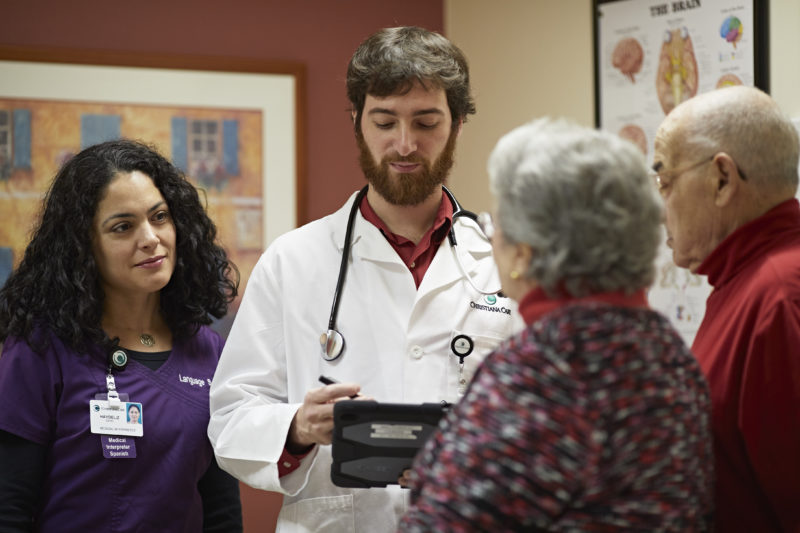
Each month, staff interpreters facilitate about 2,000 face-to-face encounters with patients and families with limited English proficiency. That is a dramatic increase from the 24 encounters logged in March 2012, the first month the service kept statistics.
In the beginning, Language Services operated with a staff of four. Today, the team includes 24 interpreters and a scheduler. They speak languages including Spanish, American Sign Language, Mandarin, Bengali and Hindi. More than 90 other Christiana Care employees have completed training to serve in the Language Interpreter Network at Christiana Care (LINCC), offering interpretation in 23 languages. There are plans to hire an Arabic interpreter, as well as a second interpreter in Mandarin to serve Delaware’s growing Chinese community.
Language services are free of charge to patients and families. Ortiz notes that studies have shown that qualified medical interpreters play a role in reducing health care costs. Patients with limited English proficiency who communicate through interpreters have a 1.5-day shorter length of stay in the hospital, on average, than patients who do not. In the Emergency Department, language services reduce the costs of tests by about 30 percent.
“Research shows that when providers are not understanding the patient, they tend to order more tests to make sure they aren’t missing something,” Ortiz said.
Video remote interpreting, connecting with patients through tablet devices, enables interpreters to offer immediate assistance to patients and their families at Christiana Care practices out in the community, including Smyrna and Middletown, and at Concord Health Center in Chadds Ford.
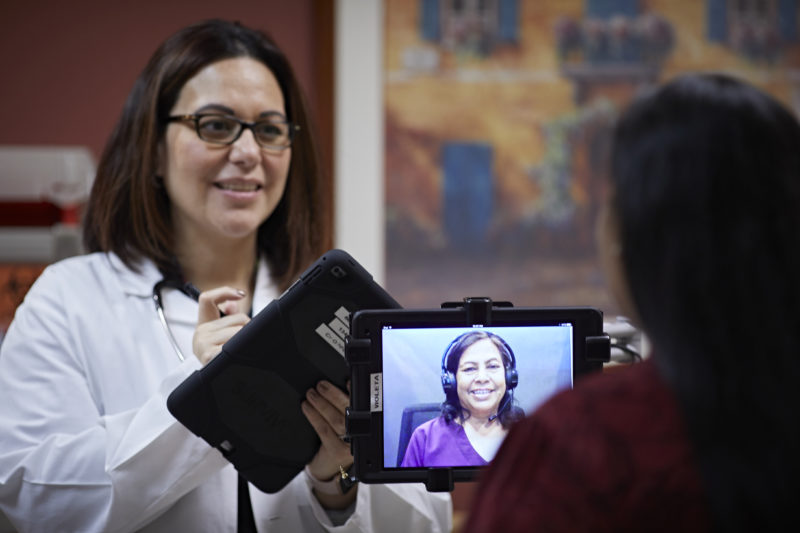
“It works like FaceTime and adds to the quality of interpreting, because there is more of a sense of trust when you can see the interpreter,” Ortiz said. “The visual component is also very important for patients in diabetes education, wound care and other areas.”
Clear, accurate communication enhances safety
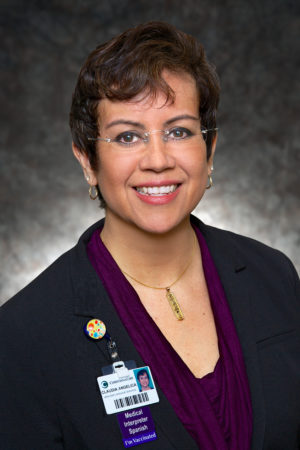
The importance of using qualified medical interpreters can often be best understood by considering what can happened if they aren’t available. For example, one recent patient in the Emergency Department consistently answered “yes” to questions from nurses when he was asked if he wanted to harm himself. In a system without the benefit of qualified interpreters, such a patient might involuntarily have been committed to a psychiatric unit based on his responses.
“As it turns out, he was saying ‘yes’ to every question because he didn’t understand English,” said Claudia Angelica Reyes-Hull, manager of Language Services. Thanks to Language Services and the alert care team, the patient received appropriate care.
Patients who use Language Services are tagged in their electronic records so if they need care again an interpreter is dispatched as soon as possible. One returning Spanish-speaking patient was initially being treated for a fall. Her interpreter quickly discovered the patient had not fallen; she had been bitten by a snake.
Language Services team members educate staff throughout the health system about the pitfalls of having a family member interpret for relatives. For example, in some cases, patients misuse their medication because they are relying on children to read them instructions.
A family member of a patient with an infection consented to surgery without telling the patient that a limb would be amputated. When the patient realized what would be done, he refused to have the life-saving procedure until a qualified interpreter was used to explain the importance of the surgery.
“Family members withhold what they think is painful information from their relatives,” Reyes-Hull said. “Interpreters are trained to keep their feelings out of it.”
The need for qualified interpreters continues to grow. The Spanish-speaking population of Delaware is projected to double by 2060. The Asian and South Asian populations also are expanding.
“Interpreting is not just talking,” Ortiz said. “It’s a complex skills set that requires capturing the meaning of what is said, converting the message into another language and rendering it in a way that respects the message’s original intent.”
Language Services will meet that need by educating staff, continuing LINCC training, providing face-to-face, telephonic and video services, and translating medical documents and forms into other languages. Their work embodies the values of Christiana Care, embracing diversity and showing respect to everyone, and anticipating the needs of others to help with compassion and generosity.
